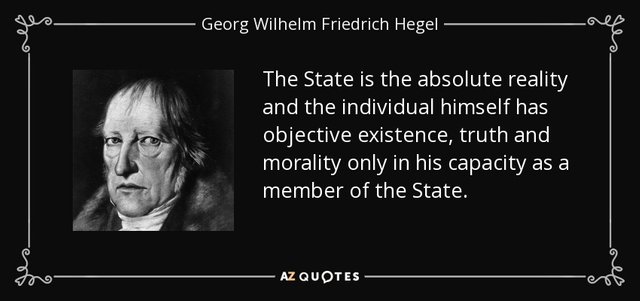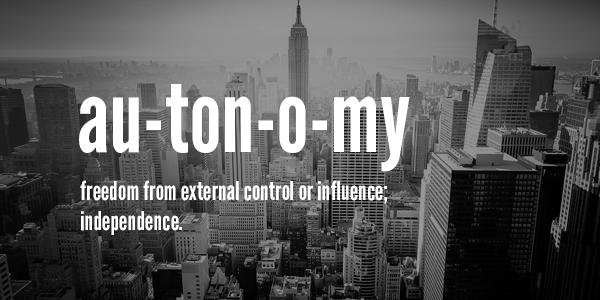Philosophy 101, #12: Can we achieve Freedom and Autonomy in Hegel’s ideal kingdom?

Having explained Hegel’s Sittlichkeit thesis in my previous post, I will now discuss whether individuals can become truly autonomous in Sittlichkeit. In short, I believe that it’s practically impossible.
In my previous post, Philosophy 101 #11, I have written that Hegel has posited individuals inside communal entities that he deems necessary for the progression of individual freedoms. The notion that individuals find their absolute freedom in social institutions that correspond to their subjective needs and desires is, I believe, highly problematic. According to Hegel, individuals are free under conditions where they work for the collective good without giving up their particular identities. However, we do often not understand who we are, nor do we understand our subjective desires, so how can we know for sure that the actions we take are expressions of our identity?
Self-reflection and self-invention are required to understand our identities
I would like contend that the only way to understand ourselves is through self-reflection and self-invention. Sittlichkeit, unfortunately, restrains individuals in their self-invention, because communal entities hold authority over customs and moralities. Individuals, according to Hegel, have obligations to abide by the customary moralities of his communes: the family, civil community, and the state. However, autonomy, defined by Nietzsche as the condition to give oneself one’s own laws, cannot be embedded in such communes. Instead, autonomy is the result of individualistic endeavours and is often gained as a result of the rejection of communal customs, because they hold us in bondage. As Nietzsche says in The Dawn of Day (1881), the morality of customs relates to
“the age, the sanctity, and the unquestioned authority of the custom”.

Sittlichkeit holds moral authority over the individual
Sittlichkeit is predicated on a customary morality that pre-exists the individual and holds moral authority over him before he was even born. The individual is then still chained to the historical morality of his people, making him more similar to people in the same community. When others have authority over us in claiming what is right and wrong, then there is little room left for us to invent our personal morality. I agree with Hegel that “every one is a son of his time”. However, individuals should also have the autonomy to divert from this history and create their own distinctive personhoods. The family and any other ethical unit can be abusively restrictive to individual autonomy, stripping people from their freedom of self-invention. The resistance that the autonomous individual will face is grounded in the community’s mistrust of that what is different.
Sittlichkeit emphasizes self-limitation
The second reason why individuals cannot achieve true autonomy in Sittlichkeit, is due to its emphasis of self-limitation. According to Hegel, the individual has to limit himself in order to become liberated in the social spheres of the family, civil society and the state. In a paragraph on the people who enter into marriage, he writes for example that they
renounce their natural and individual personality to this unity of one with the other. … their union is a self-restriction, but in fact it is their liberation, because in it they attain their substantive self-consciousness.
For Hegel, the individual is a subject of his community and his experience of selfhood is dependent on the recognition of others. However, I would like to desubjectivize the individual, pull him free of himself and his community, make him the source of all morality, and prevent him from being the same. The individual can only be truly autonomous if he rejects communal customs so that he can invent his own morality. Hegel says that in intersubjective actions, we recognize each other reciprocally as subjects of unique value to each other, because without the other we would feel deficient and incomplete. The self-worth of individuals is in my opinion too dependent on his community. Freedom, I believe, means feeling at home with oneself, and not so much feeling at home in the world as Hegel would contend.

The State is antithetical to individual freedom and autonomy
Furthermore, I believe that the state cannot restrict people in their desires. In Thus Spoke Zarathustra, Nietzsche calls the state the “coldest of all cold monsters” and argues that the “idolaters” of the state “hang a sword and a hundred inordinate desires” above the people. It can make its people poorer or richer, but it is an institution that desires power and “first of all that lever of power, lots of money”. (Nietzsche, 1883-1885, pp. 36-38) The state will thus perpetuate non-restrictive lust for power as it will attract individuals to resist customary ethical life in order to use the state for their advantage.
Faith in the state implies fath in herd morality
Another argument why individual autonomy cannot be obtained in Hegel’s Sittlichkeit thesis is because faith in the state implies a faith in herd morality. Hegel’s faith in social institutions is especially obvious in assertions like
[T]he march of God in the world, that is what the state is.
The radical belief in the state as the provider of solid ethical values seems similar to the radical belief in religion. The only difference between both faiths is that one is a zealous belief in the state and its rationality, whereas the other is a passionate belief in a higher spiritual power. Both are however grounded in the belief in external entities; either the community to which the individual belongs or God. Under both circumstances, the individual negates his personal morality and praises herd morality as both prescribe customary group moralities. By zealously believing in the state, albeit a rational one, the individual will run the risk in subverting his own morality and therefore his personal autonomous ethical well-being for this higher ‘religion’ (the state) that is composed of communal dogmas and traditions. Moreover, Hegel’s emphasis on duties towards the state in combination with the self-negation for the greater good may sound plausible ideally, but it is a frightening notion for individual freedom in practice. How can Sittlichkeit make sure that monarchs with illustrious powers will not abuse its members’ duties to the state?
Conclusion
This article has attempted to explain why man cannot achieve freedom and autonomy in Hegel’s Sittlichkeit. There is the danger that individual members are stripped from self-inventive powers, because they are pushed into moral directions by the customs of their communities. The individual should be fearful for moral conformism in Hegel’s Sittlichkeit as it negates individual autonomy. In addition, Sittlichkeit restrains individuals in their self-invention. Ultimately, the individual’s zealous belief in the rational state is actually appraisal for herd morality as Nietzsche would have called it.
References
Knox, T.M. (1967). Hegel’s Philosophy of Right.
Lim, C.L. (2017). Philosophy 101, #11: Freedom and Autonomy in Hegel’s Philosophy of Rights. https://steemit.com/philosophy/@chhaylin/philosophy-101-11-freedom-and-autonomy-in-hegel-s-philosophy-of-rights
Nietzsche, F.W. (1881). The Dawn of Day.
Nice article!
Another one I great article :) Thanks for posting!
Thank you for your nice comment. :)
Morality only exists and make sense if it is objective. Otherwise nobody can impose his morality on the others.
That's an interesting observation. :)
Hey friend, sorry to disturb your blog but I need to exchange some money. Would you like to buy again? Just send around 50 dollares and tomorrow I will send you the SBD. It would help me a lot because I have nothing anymore. Please check my incoming payouts, I got it coming in :)
Hi Shla, how much is 50 dollars in Euro? I'm fine sending you more money, but I think it's good to set an exchange rate first. How much Euro for how many SBD's?
I can send you tonight when I'm back from work. :)
50 SBD is 40.20 Euro (10 in the morning July 26)

Ok, good. I'll send you tonight when I'm back home from work. Is that OK for you? :)
Yes, take a 5 percent discount if you want. I hope that I will have exactly 50 SBD tonight to send it to you. I am powering down and in 2 days I will definitely have enough. I hope this is OK with you, because I do not see the exact number of SBD which I will receive. Is that OK with you (please say yes)
It's OK :)
Super, thanks!
I just sent 40.20 EUR to you at 00:20 AM, July 27. :)
Send me your SBD once you have it available.
Benefit article
Keep